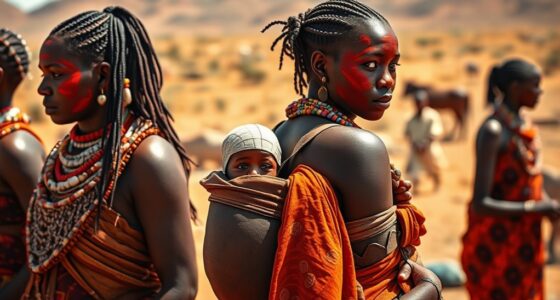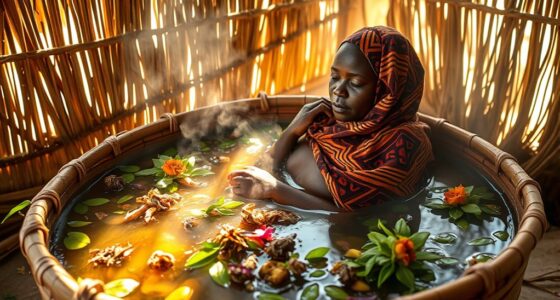In Māori culture, whānau play a crucial role in supporting women during childbirth by actively participating in cultural rituals like karakia and waiata, offering emotional reassurance, and preparing a space that reflects traditional values. They combine spiritual practices with physical support, strengthening ancestral connections and fostering a sacred, calming environment. This collective involvement upholds cultural identity and legacy. To learn more about how Māori whānau integrate these customs into childbirth, explore further details here.
Key Takeaways
- Whānau actively participate from labor to post-birth, offering emotional support and cultural rituals like karakia.
- Rituals such as karakia and waiata invoke spiritual protection and reinforce cultural identity during childbirth.
- Birth is seen as a continuation of ancestral legacy, strengthening spiritual connection through whakapapa and ancestral prayers.
- Traditional skills include specific positioning, symbolic items like pounamu, and natural elements, emphasizing community and cultural practices.
- Modern adaptations blend traditional rituals with healthcare, involving cultural advisors and ensuring Māori values are respected within birthing settings.
The Role of Whānau in Maori Birth Practices
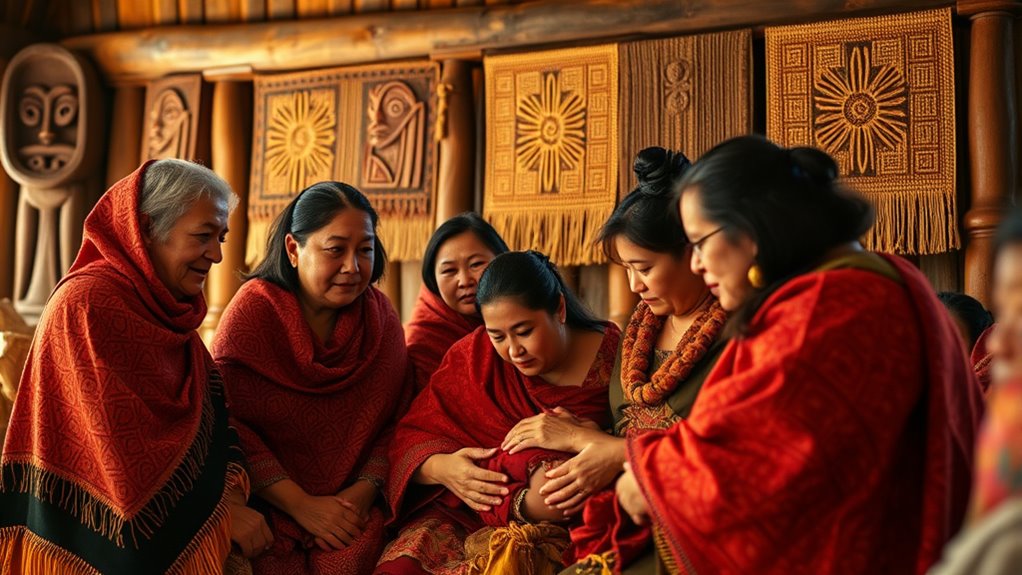
In Maori birth practices, whānau play a vital and active role, providing emotional support and helping to uphold cultural traditions. You’re often involved from the moment labor begins, offering reassurance and comfort to the mother. Your presence helps create a familiar, supportive environment, easing her anxiety. Whānau also participate in specific cultural practices, such as singing karakia (prayers) or performing rituals to invoke protection and guidance. You might prepare the birthing space, ensuring it reflects cultural values and customs. Your involvement isn’t limited to emotional support; you also help carry out traditional roles, like assisting with feeding, cleaning, or caring for the newborn after birth. Incorporating cultural decor into the birthing space can enhance the sense of connection and tradition. Ultimately, your active participation reinforces cultural identity and strengthens the bond between mother, baby, and community.
Spirituality and Rituals During Childbirth
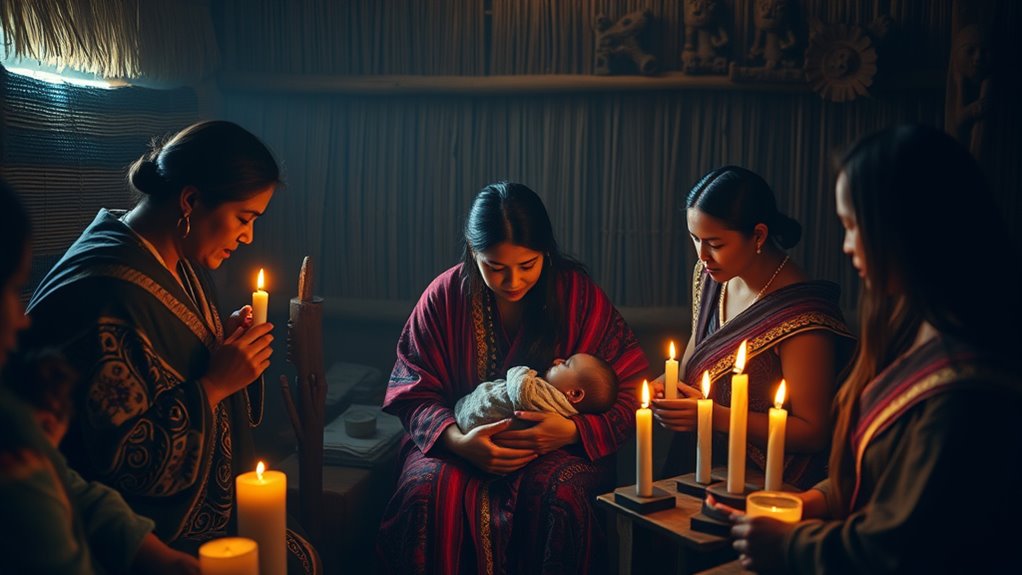
During childbirth, spirituality and rituals serve as powerful anchors that connect you and your whānau to ancestral traditions and spiritual guidance. These practices help create a sacred space, fostering a sense of calm and spiritual protection. You might incorporate karakia (prayers) to invoke blessings and safeguard both mother and baby. Rituals such as waiata (songs) or specific gestures honor the sacredness of birth, reinforcing cultural identity and spiritual connection. These acts remind everyone involved of the spiritual significance of welcoming new life. By engaging in these rituals, you guarantee that the birthing process aligns with your cultural values, fostering a sense of unity, purpose, and spiritual reassurance during this profound moment. Additionally, understanding the importance of calibration in maintaining the accuracy of cultural practices can deepen the spiritual experience and ensure rituals are performed with the intended significance.
Significance of Ancestral Connections in Birthing
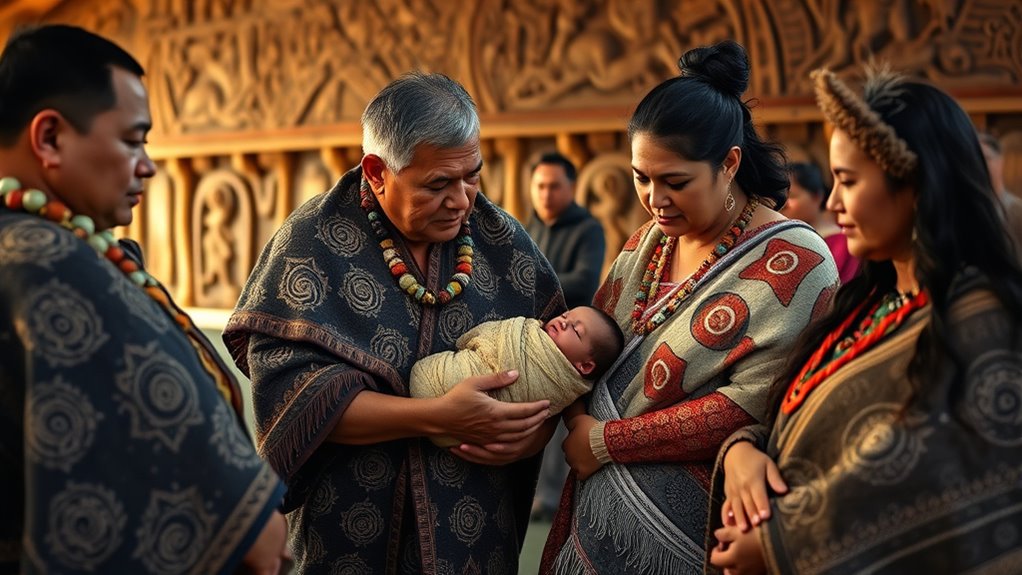
Connecting with your ancestors holds profound significance in Māori birthing practices because it reinforces your cultural identity and spiritual heritage. By acknowledging your whakapapa, you honor the lineage that shapes your identity and connects you to your whenua (land). This connection provides strength, reassurance, and a sense of belonging during childbirth. You may incorporate ancestral prayers, karakia, or rituals to invite the spirits’ guidance and protection, emphasizing that your ancestors are present and supporting you. Recognizing these connections helps you feel rooted in your traditions, reminding you that birth is not just a personal journey but a continuation of your family’s legacy. Embracing this bond affirms your place within the Māori worldview, where ancestors remain an integral part of every life event. Incorporating cultural practices into your birthing experience can deepen your connection to these ancestral bonds and enrich your spiritual journey.
Traditional Maori Birthing Skills and Practices
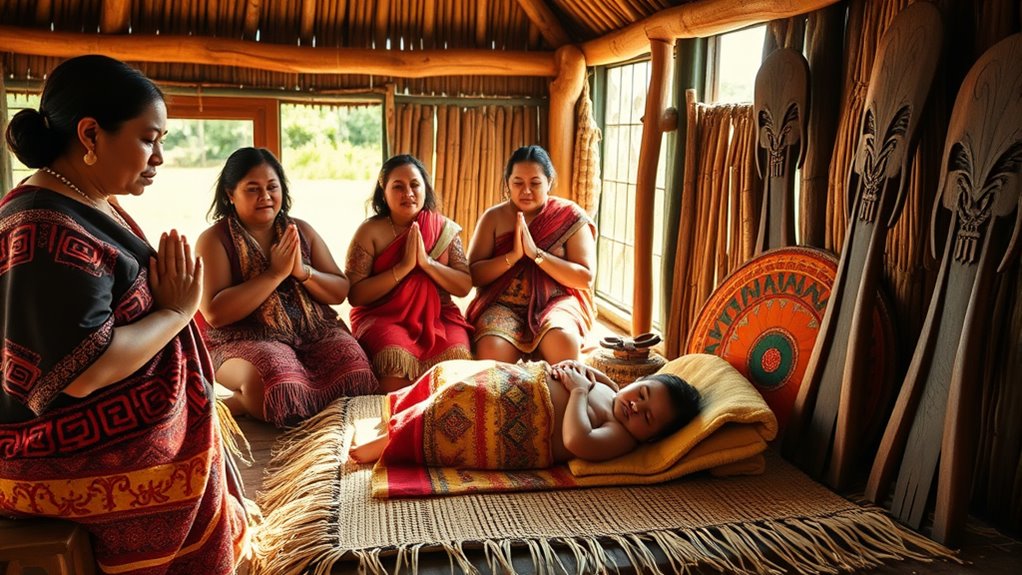
Building on the importance of ancestral connections, Māori birthing practices incorporate specific skills and rituals passed down through generations to support women through labor and delivery. These practices include using traditional karakia (prayers), calming waiata (songs), and specific positioning techniques to ease pain and encourage birthing confidence. You might also observe the use of symbolic items like pounamu (greenstone) for protection or the incorporation of natural elements like water and whenua (land). These skills are shared within whānau, emphasizing community support. Additionally, understanding traditional practices can deepen the cultural significance of the birthing process. Here’s a quick overview:
| Skill/Practice | Purpose | Tool/Element |
|---|---|---|
| Karakia | Spiritual protection | Chanting |
| Waiata | Emotional comfort | Singing |
| Positioning techniques | Ease labor | Body posture |
These traditions foster a sense of connection, strength, and cultural identity during one of life’s most profound moments.
Contemporary Adaptations and Preservation of Cultural Traditions
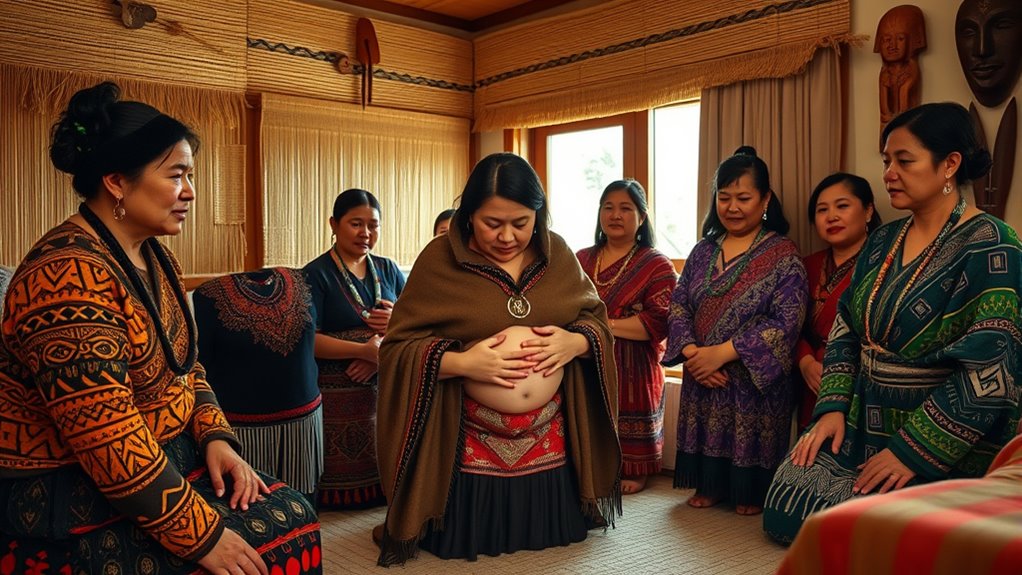
Contemporary Māori birthing practices blend traditional rituals with modern healthcare, guaranteeing cultural significance remains intact while accommodating current medical standards. You might see whānau-led ceremonies incorporated into hospital settings, respecting Māori customs around birth. Many practitioners now work to preserve te reo Māori and traditional karakia during childbirth, connecting families to their heritage. Cultural advisors and kaumātua are often involved, offering support and guidance. Some communities have developed birthing units specifically designed to reflect Māori values, blending tikanga with clinical care. This fusion helps families feel grounded in their identity while accessing advanced medical services. Additionally, efforts are underway to formalize cultural protocols within healthcare systems, ensuring respectful and consistent integration of tikanga Māori. By adapting practices thoughtfully, you guarantee that tikanga Māori continues to thrive, fostering a sense of pride and continuity for future generations.
Frequently Asked Questions
How Do Maori Birth Practices Differ From Western Methods?
You’re curious about how Maori birth practices differ from Western methods. You’ll find that Maori traditions emphasize family involvement, spirituality, and connection to nature during childbirth. Unlike Western approaches that often focus on medical intervention and technology, Maori practices prioritize holistic well-being, rituals, and the support of whanau. You might notice more emphasis on cultural customs, prayer, and whenua (land), creating a deeply personal and communal birth experience.
What Specific Rituals Are Performed During Maori Childbirth?
During Maori childbirth, you might observe rituals like karakia (prayers) to invoke spiritual protection, and the use of whānau (family) support for emotional strength. You may see the immersion of the newborn in water for cleansing or the blessing of the baby with symbolic items. These rituals honor cultural values, connect you to ancestors, and foster a sense of spiritual well-being for both mother and child.
How Is the Role of Men Integrated Into Maori Birthing Customs?
Imagine a birth scene so sacred it could move mountains. In Maori customs, men play a crucial role by offering support, protection, and participating in rituals that honor the baby’s arrival. They often stand by the mother, providing strength and reassurance. Their involvement isn’t just physical but spiritual, helping to create a powerful, shared connection with the whenua (land) and whānau (family).
Are There Maori Birth Support Services Available Today?
You’ll find that Maori birth support services are widely available today, emphasizing cultural practices and whanau involvement. These services often include traditional birthing practices, guidance from kaumātua, and support networks that respect Maori customs. You can access specialized midwives and community resources dedicated to integrating cultural values into the birthing experience, ensuring that your cultural heritage is honored and that you feel supported throughout this important time.
How Do Maori Traditions Influence Postnatal Care?
You might find that gentle cultural influences shape postnatal care in meaningful ways. Maori traditions often emphasize whānau involvement, spiritual well-being, and traditional practices like karakia (blessings), which foster healing and connection. These customs encourage you to nurture not just the body, but also the spirit and community bonds. By integrating these values, Maori postnatal care supports holistic recovery, honoring ancestral practices while embracing modern health approaches.
Conclusion
You can see how vital whānau support is in Maori birth practices, blending tradition with modern life. Nearly 80% of Maori mothers still incorporate cultural rituals during childbirth, highlighting the deep importance of ancestral connections and spirituality. By preserving these practices, you help guarantee that cultural identity stays strong for future generations. Embracing both tradition and adaptation allows you to honor your roots while steering through contemporary childbirth with pride and confidence.


